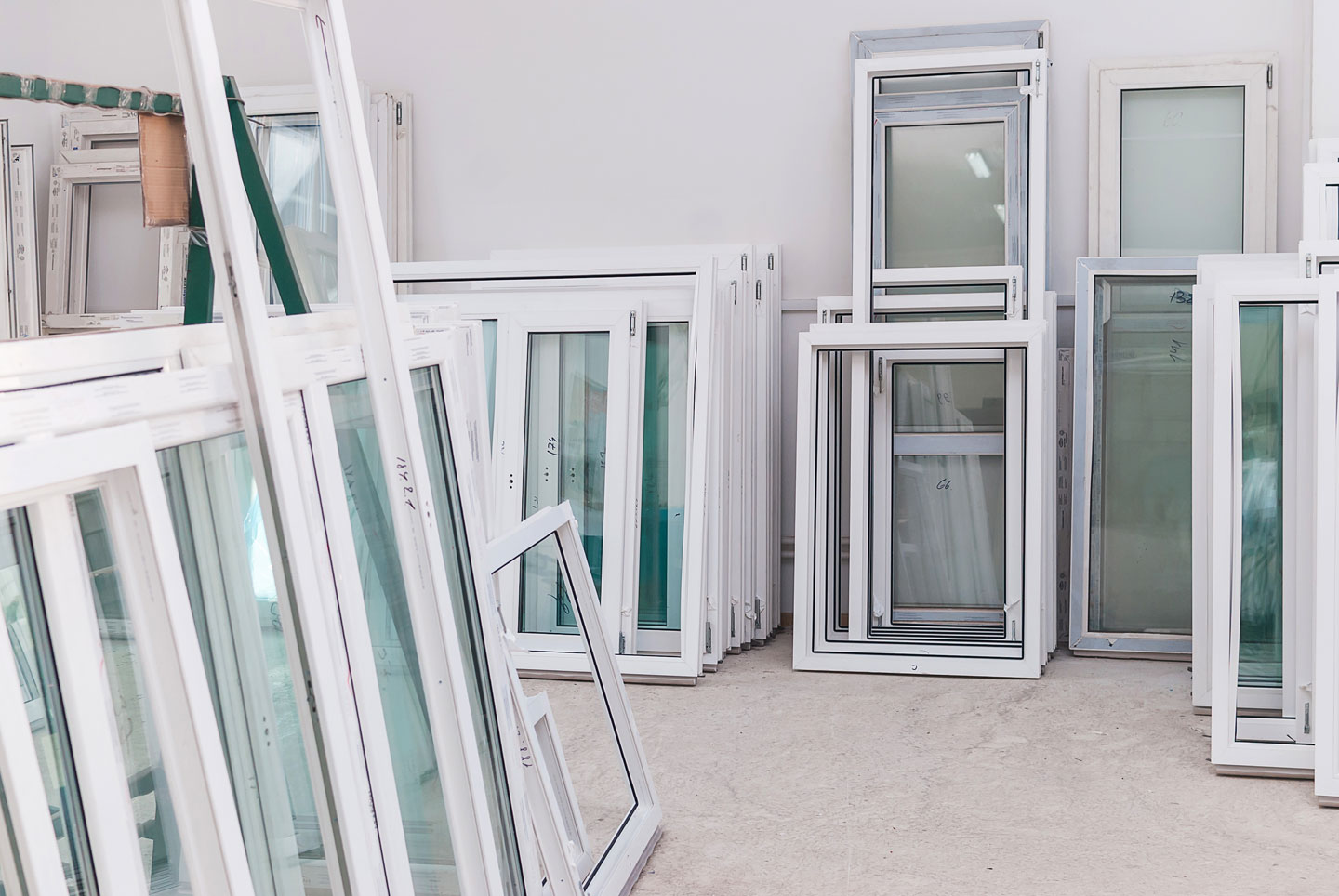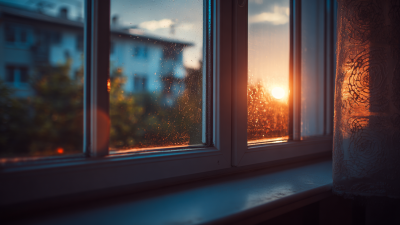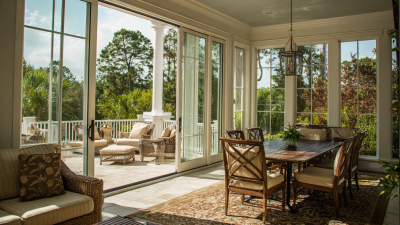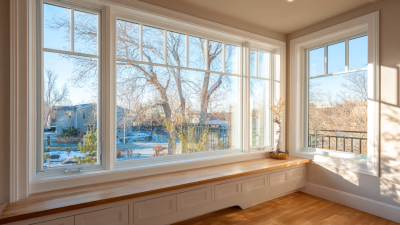
6 Essential Tips for Choosing Vinyl Windows and Doors That Save You 30 Percent on Energy Bills
When it comes to enhancing energy efficiency in homes, selecting the right products is crucial. Vinyl windows and doors have emerged as a top choice for homeowners looking to reduce energy bills and improve overall comfort. According to the U.S. Department of Energy, improper windows can account for up to 25% of a home's heating and cooling costs. By opting for high-quality vinyl windows and doors, homeowners can potentially save as much as 30% on their energy bills, making a significant impact on both their wallets and the environment. Additionally, a report from the National Association of Realtors indicates that energy-efficient upgrades like vinyl installations can lead to increased home value. In this context, understanding how to choose vinyl windows and doors wisely becomes essential for long-term energy savings and enhanced living spaces.

Key Factors to Consider for Energy-Efficient Vinyl Windows and Doors
When selecting vinyl windows and doors for energy efficiency, several key factors should be prioritized. First, look for products that feature superior insulation properties. High-performance vinyl options often include multiple chambers that trap air, reducing heat transfer, which is essential for maintaining comfortable indoor temperatures. Enhanced glazing techniques, such as Low-E coatings, further minimize energy loss by reflecting heat back into the home during winter while keeping excessive heat out during summer.

In addition to thermal performance, consider the overall design and durability of the windows and doors. Opt for models that combine aesthetic appeal with long-lasting materials designed to withstand harsh weather conditions. This not only contributes to energy savings but also ensures your investment stands the test of time. Ultimately, choosing the right vinyl windows and doors can lead to significant reductions in energy bills, enhancing both your home's comfort and your financial wellbeing.
Top Features that Maximize Energy Savings in Vinyl Installations
When choosing vinyl windows and doors, it’s crucial to focus on features that maximize energy savings. According to the U.S. Department of Energy, replacing aging windows can save homeowners up to 30% on their energy bills. Look for ENERGY STAR® certified products with low-emissivity (Low-E) glass. This type of glass blocks heat from the sun in the summer while retaining warmth during winter, creating a comfortable, energy-efficient indoor environment.

Another important feature to consider is multi-chambered frames. These designs improve insulation by trapping air, which reduces heat transfer between the interior and exterior. The National Fenestration Rating Council (NFRC) suggests that windows equipped with insulated frames can significantly decrease heating and cooling costs, particularly in extreme climates.
Finally, checking the window's U-factor is essential. The U-factor measures heat loss; a lower U-factor indicates better insulation. Aim for products with U-factors below 0.30 for optimal performance. By prioritizing these features in your selection process, you can enhance the energy efficiency of your home while enjoying substantial savings on your energy bills.
Understanding the Role of Insulation in Reducing Energy Costs
When selecting vinyl windows and doors, understanding the role of insulation is paramount in achieving energy efficiency. Insulation acts as a barrier to heat transfer, ensuring that your home remains comfortable year-round. Properly insulated windows and doors can significantly reduce the amount of heated or cooled air that escapes from your home, which directly impacts your energy bills. The effectiveness of insulation is often determined by factors such as the frame material, the type of glazing, and the thickness of the insulating core.
In addition to choosing high-quality insulation materials, it's essential to consider the energy performance ratings of windows and doors. Look for products that feature low-E (low emissivity) glass, as this helps reflect heat back into the room during winter and keeps it out during summer. Furthermore, ensure that the seals around windows and doors are tightly fitted and weatherproofed. This not only enhances overall insulation but also aids in preventing drafts. By prioritizing insulation in your selection process, you can make a significant impact on reducing energy consumption and, consequently, save on energy bills.
Energy Savings from Vinyl Windows and Doors
This chart illustrates the potential annual energy savings on your bills based on the quality of insulation provided by vinyl windows and doors. As insulation quality improves, energy costs can be reduced significantly, demonstrating the value of investing in high-performance products.
How to Select the Right Glass Options for Ultimate Energy Efficiency
When selecting vinyl windows and doors, the glass options you choose can significantly impact energy efficiency. According to the Department of Energy, about 25% to 30% of residential heating and cooling energy use is due to heat gain and loss through windows. To maximize efficiency, consider low-emissivity (Low-E) glass, which can reduce energy loss by reflecting interior temperatures back into your home while keeping outside temperatures at bay. This type of glass is coated with a thin layer of metallic oxide, which can enhance window performance by up to 40% compared to standard glass.
Another important factor is the gas fill. Double or triple-glazed windows filled with argon or krypton gas provide better insulation than those filled with air. A report from the National Fenestration Rating Council (NFRC) states that windows with argon gas can improve energy efficiency by 30% compared to air-filled windows.
Tip: Always check the energy performance ratings, such as U-factor and Solar Heat Gain Coefficient (SHGC), to ensure you are choosing windows that will provide optimal insulation and sunlight control. Additionally, aim for windows that meet or exceed ENERGY STAR® guidelines for your climate zone to further enhance energy savings.
Cost-Benefit Analysis: Long-Term Savings from Vinyl Windows and Doors
Investing in vinyl windows and doors offers significant long-term savings that can greatly reduce your energy bills. When conducting a cost-benefit analysis, it is essential to consider not just the upfront costs, but also the ongoing expenses associated with energy consumption. Vinyl windows and doors are designed with thermal insulation properties that can enhance energy efficiency, often resulting in savings of up to 30 percent on heating and cooling costs. This reduction is especially beneficial in extreme climates where energy usage tends to be higher.
Beyond immediate energy savings, the durability and low maintenance of vinyl products contribute to long-term financial advantages. Unlike wood, which may require regular painting or treatment, vinyl is resistant to weathering, ensuring that your investment remains intact over the years. Additionally, many vinyl window and door manufacturers offer warranties that further protect your investment. Ultimately, the long-term savings on energy bills, combined with the decreased maintenance costs, make vinyl windows and doors a smart choice for homeowners looking to improve their property’s efficiency and reduce expenses over time.
6 Essential Tips for Choosing Vinyl Windows and Doors That Save You 30 Percent on Energy Bills - Cost-Benefit Analysis: Long-Term Savings from Vinyl Windows and Doors
| Tip | Description | Estimated Savings (%) | Long-Term Benefit ($) |
|---|---|---|---|
| Energy Efficiency Rating | Choose windows with a high energy efficiency rating. | 10% | $150 |
| Low-E Glass | Look for Low-E glass to minimize heat transfer. | 15% | $225 |
| Professional Installation | Ensure experienced professionals install the windows and doors. | 5% | $75 |
| Quality Frames | Invest in quality vinyl frames that resist warping. | 20% | $300 |
| Warranty Considerations | Check for strong warranties to protect your investment. | 3% | $45 |
| Local Climate Compatibility | Select windows designed for your local climate conditions. | 7% | $105 |
Related Posts
-

The Ultimate Guide to Choosing the Best Vinyl Fixed Windows: Insights and Data for Global Buyers
-

7 Best Advantages of Choosing Double Hung Vinyl Windows for Your Home
-

How to Choose the Best Single Hung Vinyl Windows for Your Home
-

Reliable Chinese Manufacturing of the Best Patio Doors for Global Buyers
-

Global Leaders in Patio Door Replacement Manufacturing Driving Exports to Meet Global Demand
-

The Future of Best Window Installation Trends Shaping Energy Efficiency Standards

